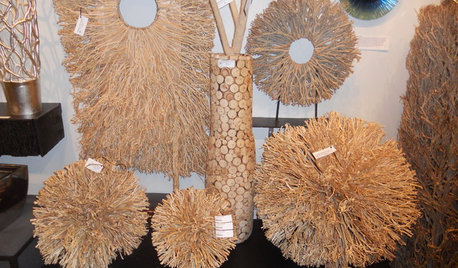Book Market Flat
Ken Druse
23 years ago
Related Stories

FURNITURE16 Favorite Chairs from High Point Market
Finds from the world's largest furnishing show: Big patterns, chic lines, and a chair worthy of the Starship Enterprise
Full Story
PRODUCT PICKSGuest Picks: Marrakesh Market
Exotic accessories and accent pieces that evoke a journey to Africa
Full Story
DECORATING GUIDESBook to Know: 'Flea Market Chic'
Think flea market finds are just old junk not fit for a modern home? If so, it's time for a read and a rethink
Full Story
ECLECTIC HOMESHouzz Tour: Light Streams Into a Once-Dark London Flat
This ground-floor apartment’s layout was reconfigured in an innovative and airy transformation
Full Story
MORE ROOMS5 Ways to Decorate Around a Flat-Screen TV
Color, Placement and Accessories Help that Big Black Screen Blend In
Full Story
RUGSFlea Market Find: Vintage Kilim Rugs
These popular floor coverings work well in every room of the house
Full Story
EVENTS5 Big Trends From This Week’s High Point Market
Learn the colors, textures and shapes that are creating a buzz in interior design at the market right now
Full Story
DECORATING GUIDESHot Looks From the Spring 2013 High Point Market
Get an eyeful of some of the colors, textures, materials and more taking a big stand at North Carolina's huge furnishings trade show
Full Story
Common Materials Go Haute at High Point Market
Inventive furniture, lighting and artwork made from everyday items provided unexpected visual treats at the 2012 market
Full Story0

ACCESSORIESHigh Point Market Branches Out Into Natural Decor
Branches, driftwood, shells and sustainable materials were big trends in decor items at the 2012 High Point Market. Take a peek here
Full StorySponsored



john p
Suzie
Related Discussions
my market garden facts 2008
Q
Good market gardening books??
Q
Very good book on farmers' markets
Q
How 'off book' operations are wrecking the RE market..or
Q
IVY KARDOKUS
Ken DruseOriginal Author
Holly
IVY KARDOKUS
john p
Marolyn
MelanieBZ
Marie
Ken DruseOriginal Author
Bill_zone6
cherylm
Ken DruseOriginal Author
Shirley Remes
nandina
Nevin
philosopher
Jcoum
burrhead
jim
claireplymouth z6b coastal MA
acj7000
Cady
oldherb
naturalgarden
Elizabeth
Claire_
Cclaire
ironbelly1
claireplymouth z6b coastal MA
Kimchi
rebaru
mom6nan
shadowgarden
trudi_d
judiz
nita1027
nita1027
nonews
Mario_Vaden
Gardenpublisher
Paula_sfbay
katycopsey
Cady
John_D
Cady
Marie Tulin
junkyardgirl
diggerb2